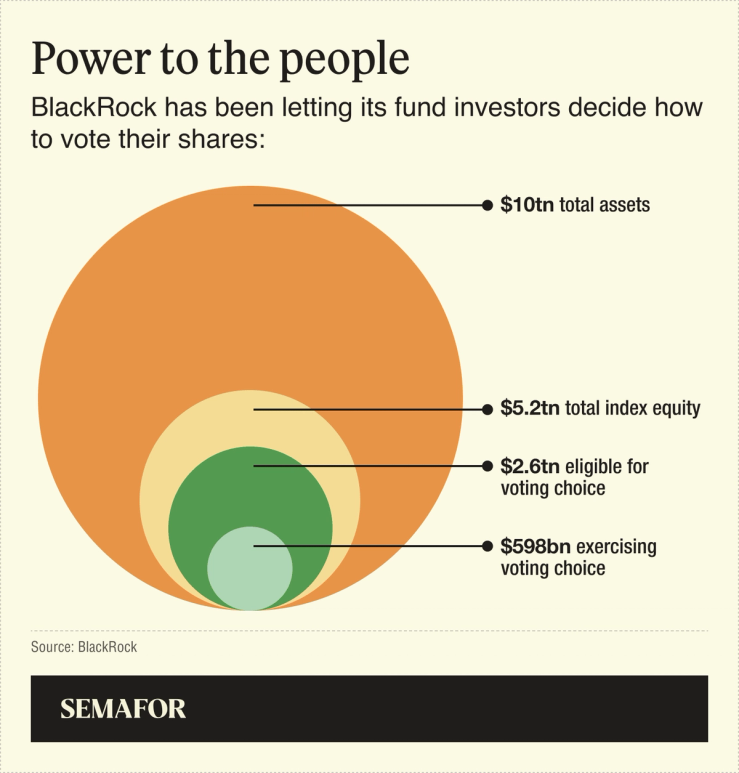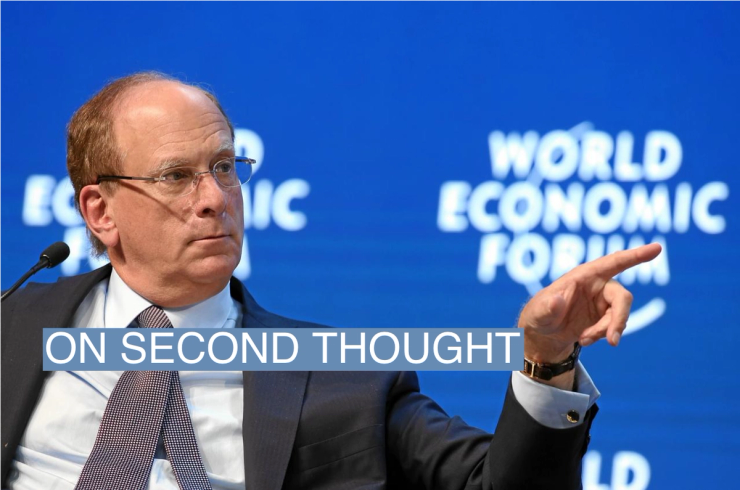The News
Congressional Republicans alleged this week that a vast left-wing conspiracy in the machinery of corporate governance is pushing a progressive agenda.
A House Judiciary Committee report accused blue-state pension funds, climate nonprofits, global alliances, activist investors, and giant money managers including BlackRock and Vanguard, of forming an illegal cartel to force companies to cut their carbon emissions, set diversity quotas, and curb their political contributions.
It’s the latest jab in the fight over corporate boardrooms. A leftward shift in the mid-2010s, turbocharged by #MeToo and Black Lives Matter, receded under a conservative backlash aided by economic turbulence that refocused executives on the bottom line. As financial performance retakes center stage for companies and investors, the furor has mostly been pushed to the partisan edges, and a close reading of the House report shows this fight has always been more commercial than ideological.
At the center of this alleged cabal, House Republicans claim, is Climate Action 100+, a coalition whose membership of investors, banks, and money managers controlled $68 trillion at its peak. Documents made public by the committee show that BlackRock and State Street were pressured into joining after Climate Action leaned on their clients — pension funds, endowments, insurers, and sovereign wealth funds that ultimately control the investments.
“Asset owners,” read minutes from a 2020 meeting of Climate Action’s steering committee, “are in the best position to shift the frustrating voting behaviors of the ‘big three,’” which Climate Action deemed insufficiently pro-environment.
One of the coalition’s founders wrote in a 2020 email made public in the House report that “BlackRock was influenced to join” the coalition by two of its clients. Japan’s $1.6 trillion government pension fund moved $50 billion from BlackRock to another asset manager, UK-based Legal & General, which had recently dumped Exxon stock from its funds. Another major allocator, Scottish Widows, made its contract with BlackRock contingent on the firm joining the coalition, according to the email.
State Street, JPMorgan, and several other big asset managers quit Climate Action this spring. BlackRock limited its participation in the group to its international arm, taking its $6.6 trillion in US assets with it.
In this article:
Liz’s view
The progressive shift at asset managers, principally BlackRock, look less like an ideological conspiracy driven by Larry Fink’s “Davos man” agenda of windmills, walkable cities, and lab-grown meat than a commercial necessity.
If BlackRock, Vanguard, and State Street were pushing a progressive agenda within corporate boardrooms, the documents in the House report show they were being pushed in that direction by their own clients.
Semafor just launched our first podcast, Mixed Signals, hosted by Ben Smith and Nayeema Raza, breaking down the media industry. Its animating principle is that the media is in fact a conspiracy, but not the one you think it is. It’s a more mundane and mostly unsuccessful conspiracy to make money, not to brainwash.
That’s why businesses do anything. Not to say that Fink didn’t believe what he was saying about carbon emissions and diversity, or that he didn’t think they were important contributors to corporate profits in the long term. He also likely saw a chance to elevate his own profile, becoming a leading voice in the corporate class. But cast in a new light, he looks more like a CEO tweaking his company’s product because some important customers stopped buying it.
There simply hasn’t been an organized “right” in investing that has had the same commercial sway.
Progressive activists have succeeded in getting their causes on corporate ballots, aided by a Securities and Exchange Commission which has largely given up its role as gatekeeper. Conservatives, who argue the SEC is biased toward left-leaning causes, have instead pulled less-effective levers, like investment blacklists that can drive up costs and are open to criticism by nonpartisan fiduciaries that are just trying to make money.
“Conservatives have completely ceded the ballot box to leftists, at our peril,” Will Hild, the executive director of Consumers’ Research, the conservative group backed by Leonard Leo, told Semafor in an interview. A report released this week by the group found there were 12 times as many left-leaning shareholder proposals between 2018 and 2022 as conservative ones.
The View From BlackRock
BlackRock has been backpedaling from the forefront of the ESG movement. Fink’s latest annual letter — which for years has served as a soapbox for his warnings about climate change and urging companies to take it seriously — was instead about a looming retirement crisis. Its 2024 guidelines for corporate engagement stressed “financial resilience” over ESG.
And it’s been rolling out the ability for individual investors in its fund to vote for themselves. “The money BlackRock manages is not our own—it belongs to our clients—and BlackRock is committed to providing clients around the world with choices to support their unique and varied investment objectives,” the company said in its dropout letter to Climate Action in February.
BlackRock wants out of the business of making decisions that alienate half the country — and get it implicated in allegations of a left-wing cabal by House Republicans.

Notable
- The problem with ESG, writes Bloomberg’s Merryn Somerset Webb, is that its definition is constantly changing. Russia’s war cleanses defense stocks, and the social unrest that energy insecurity brings changes the calculus on fossil fuel companies.


